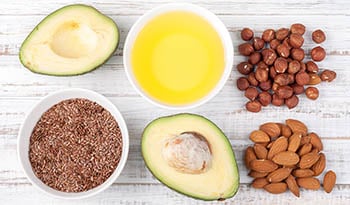The Keto Diet And Brain Health: Unlocking Cognitive Benefits

What Is The Keto-Diet?
The ketogenic (Keto) diet focuses on high healthy fats, moderate protein, and very low carbohydrates, aiming to shift the body into using fat for energy by producing ketones. The standard ratio is 60-70% fats, 20-25% protein, and 5% carbs. Common keto-friendly foods include avocado, fish, nuts, cheese, and berries.
What Is Ketosis?
Ketosis is a metabolic state in which your body primarily uses fats for fuel, producing ketones that efficiently energize both your brain and body. Although commonly associated with weight management, ketosis also offers significant cognitive advantages, making it an exceptional tool for enhancing brain health and performance.
Understanding Ketosis: A Metabolic Shift
Ketosis occurs when your body transitions from glucose (carbohydrate-derived energy) to ketones (compounds generated from stored fats). This metabolic shift provides steady energy throughout the day, enhancing memory, focus, and mental clarity. Ketones become particularly beneficial when glucose utilization is impaired, as in insulin-resistant diseases like Alzheimer’s.
To enter ketosis, dietary changes are essential, typically involving a high-fat, moderate-protein, and very low-carbohydrate diet. With adaptation, you gain multiple health benefits, including sustained energy and improved metabolism.
Brain Energy Needs And Fuel Sources
The brain, one of the most energy-demanding organs, typically uses glucose derived from carbohydrates. However, research indicates that ketones are a superior fuel source, providing cleaner, more consistent energy without glucose's fluctuations. Even when glucose is abundant, the brain preferentially uses ketones once available, boosting cognitive performance.
How Keto Benefits Your Brain
Regular ketone supply significantly enhances cognitive function, improving memory, focus, and mental clarity. Ketones optimize mitochondrial function and reduce dependence on glucose, protecting neurons from free-radical damage. Additionally, ketones possess potent anti-inflammatory properties, potentially preventing cognitive decline associated with chronic inflammation seen in Alzheimer's and Parkinson's diseases.
Insulin Resistance, Ketosis, and Brain Health
Insulin resistance, where cells become insensitive to insulin, negatively affects metabolism and brain health, linking to cognitive decline and neurodegenerative conditions. In insulin resistance, the brain struggles to use glucose, causing cognitive impairments. Ketosis provides an alternative, stable fuel source—ketones—that mitigates these cognitive issues and supports brain function, making a ketogenic diet an effective preventive strategy.
The Optimal Diet For Brain Health: Animal-Based Keto
An animal-based ketogenic diet emphasizes nutrient-rich animal foods such as quality meats, fatty fish, eggs, and organ meats. These foods deliver critical nutrients for brain health, including omega-3 fatty acids, vitamin B12, choline, and highly bioavailable proteins. Consider adding supplements to support nutrient intake when following a keto diet.
- Omega-3 Fatty Acids (found in salmon, sardines, and grass-fed beef): Vital for cell structure, reducing inflammation, and enhancing cognitive clarity.
- Vitamin B12: Essential for nerve function and neurotransmitter health.
- Choline (abundant in egg yolks and liver): Key to producing acetylcholine, crucial for learning and memory.
- Ghee: Clarified butter made from grass-fed cows, perfect for high-heat cooking and a rich source of healthy fats that support gut and brain health.
Metabolic Benefits: Enhanced Fat-Burning and Cognitive Performance
Ketosis enhances your body's metabolic efficiency, notably improving fat-burning capabilities. Increased metabolism promotes autophagy—your body’s way of clearing out and renewing damaged cells. This process is especially crucial for maintaining optimal brain function, reducing inflammation, and sustaining cognitive clarity.
Dispelling Common Myths About The Keto Diet
- Myth: The keto diet is unhealthy long-term.
Reality: With balanced nutrition, the keto diet can be safely sustained long-term. - Myth: The keto diet depletes nutrients.
Reality: A well-formulated keto diet meets all nutritional needs. - Myth: The keto diet negatively impacts cholesterol.
Reality: The keto diet has been shown to improve cholesterol profiles, boosting beneficial HDL cholesterol. - Myth: The brain exclusively needs glucose.
Reality: The brain effectively uses and prefers ketones when available. - Myth: The keto diet hinders athletic performance.
Reality: After adaptation, the keto diet typically enhances endurance and energy stability.
Conclusion
Ketosis offers a powerful, practical method to optimize cognitive clarity and neurological health. Adopting a ketogenic diet and lifestyle can sustainably enhance brain health and overall vitality.
References:
- Jensen, N. J., Wodschow, H. Z., Nilsson, M., & Rungby, J. (2020). Effects of Ketone Bodies on Brain Metabolism and Function in Neurodegenerative Diseases. International Journal of Molecular Sciences, 21(22), 8767.
- Phillips, M. C. L., Murtagh, D. K. J., Gilbertson, L. J., Asztely, F. J. S., & Lynch, C. D. (2018). Low-fat versus ketogenic diet in Parkinson's disease: A pilot randomized controlled trial. Movement Disorders, 33(8), 1306-1314.
- Koppel, S. J., & Swerdlow, R. H. (2018). Neuroketotherapeutics: A modern review of a century-old therapy. Neurochemistry International, 117, 114-125.
- Henderson, S. T. (2008). Ketone bodies as a therapeutic for Alzheimer's disease. Neurotherapeutics, 5(3), 470-480.
- Neal, E. G., et al. (2008). The ketogenic diet for the treatment of childhood epilepsy: A randomized controlled trial. The Lancet Neurology, 7(6), 500-506.
- Bikman, B. (2021). Why We Get Sick: The Hidden Epidemic at the Root of Most Chronic Disease—and How to Fight It. BenBella Books.
- Volek, J. S., Phinney, S. D. (2012). The Art and Science of Low Carbohydrate Living: An Expert Guide to Making the Life-Saving Benefits of Carbohydrate Restriction Sustainable and Enjoyable. Beyond Obesity LLC.
- Westman, E. C., Feinman, R. D., Mavropoulos, J. C., Vernon, M. C., Volek, J. S., Wortman, J. A., ... & Phinney, S. D. (2007). Low-carbohydrate nutrition and metabolism. The American Journal of Clinical Nutrition, 86(2), 276-284.
DISCLAIMER:This Wellness Hub does not intend to provide diagnosis...
















































































 Table of Contents
Table of Contents











